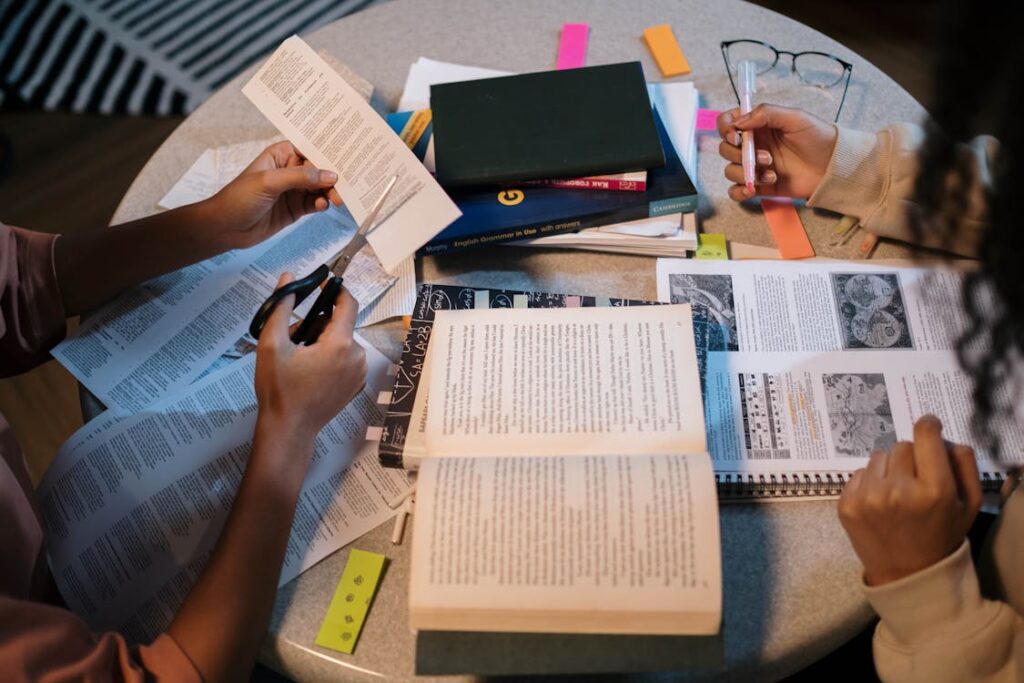Description: In this blog article, Science tutor Faith, shares with us unique ways to level up revision techniques that beat reading through notes.
One of the most common ways to revise is by reading through your notes.
Unfortunately, it is also one of the least effective methods for retaining information long-term.
In this post, I suggest five alternative revision techniques that are more effective to help you ace your next exam.
Blurting
Blurting is a highly effective technique involving active recall — forcing your brain to retrieve information without aids.
To start, pick a topic from your exam specification and grab a piece of paper.
Write down everything you can remember about the topic, no matter how disorganised or messy it is. Just keep writing until you hit a blank.

Once you’re finished, refer back to your notes and compare.
Any missed points should be noted for further revision.
This helps you identify the gaps in your knowledge.
The information you were able to recall is stored in your long-term memory, so you can prioritise revising what you missed rather than spending more time on topics you already know well.
Read Through Past Papers and Mark Schemes
On days when motivation is low, and you find yourself wanting to just skim through notes, consider a different approach: reviewing past papers and mark schemes.
This technique is invaluable, as it not only helps you understand the material but also gives you insight into what examiners are looking for in your answers.

Familiarising yourself with mark schemes will help you understand the criteria used to give marks, and you’ll notice how similar exam questions can be year after year.
By mastering these mark schemes, you can strategically approach exam questions and increase your chances of getting top marks.
Three-Colour Questions
Use different coloured pens to track your progress in answering exam questions.
First, try answering a set of practice questions from memory using one colour.
Next, take out your notes and use a second colour to add any details you missed.
Finally, review the mark scheme and use the third colour to fill in the remaining gaps.

This method enhances active recall and helps you visualise your strengths and weaknesses.
The colour-coding gives a clear indication of which areas need more attention and which topics you are confident about.
It also reinforces links in your brain between the information you’ve remembered and the points you’ve forgotten, making it easier to recall them in the future.
Create Your Own Mnemonics
Mnemonics are memory tools that make remembering facts easier and more enjoyable.
They are particularly helpful for recalling information in sequence, such as lists or terms.
Create mnemonics in forms like acronyms, rhymes, or acrostics.
For example, the acronym “PMAT” helps recall the stages of mitosis: Prophase, Metaphase, Anaphase, and Telophase.
Another example is the acrostic “My Very Elderly Mother Just Sat on Uncle Ned” to memorise the order of the planets.
When you create your own mnemonics, try to relate them to something personal or interesting to you.
The more relevant or amusing they are, the more likely you are to remember them during the exam.
Watch YouTube Tutorials
Sometimes, video explanations make complex topics easier to understand.
Watching educational videos on YouTube is an effective way to reinforce learning.
The visual and auditory elements engage different parts of your brain, which helps with retention.
The next time you’re tempted to procrastinate on YouTube, pop on a revision video instead and make the most of your time!

Here are some YouTube channels to explore:
- Mr Bruff: GCSE and A-Level English Language and Literature.
- Primrose Kitten: Covers GCSE and A-Level subjects such as maths, biology, and chemistry.
- FreeScienceLessons: Science revision for GCSE and A-Level.
- CrashCourse: Broad educational videos on history, psychology, and more.
Final Note
Incorporating these techniques into your study routine will transform your learning.
Instead of relying on passive methods, these active strategies help you engage with the material meaningfully, strengthening your memory and preparing you for exams with confidence.
By tutor, Faith.




